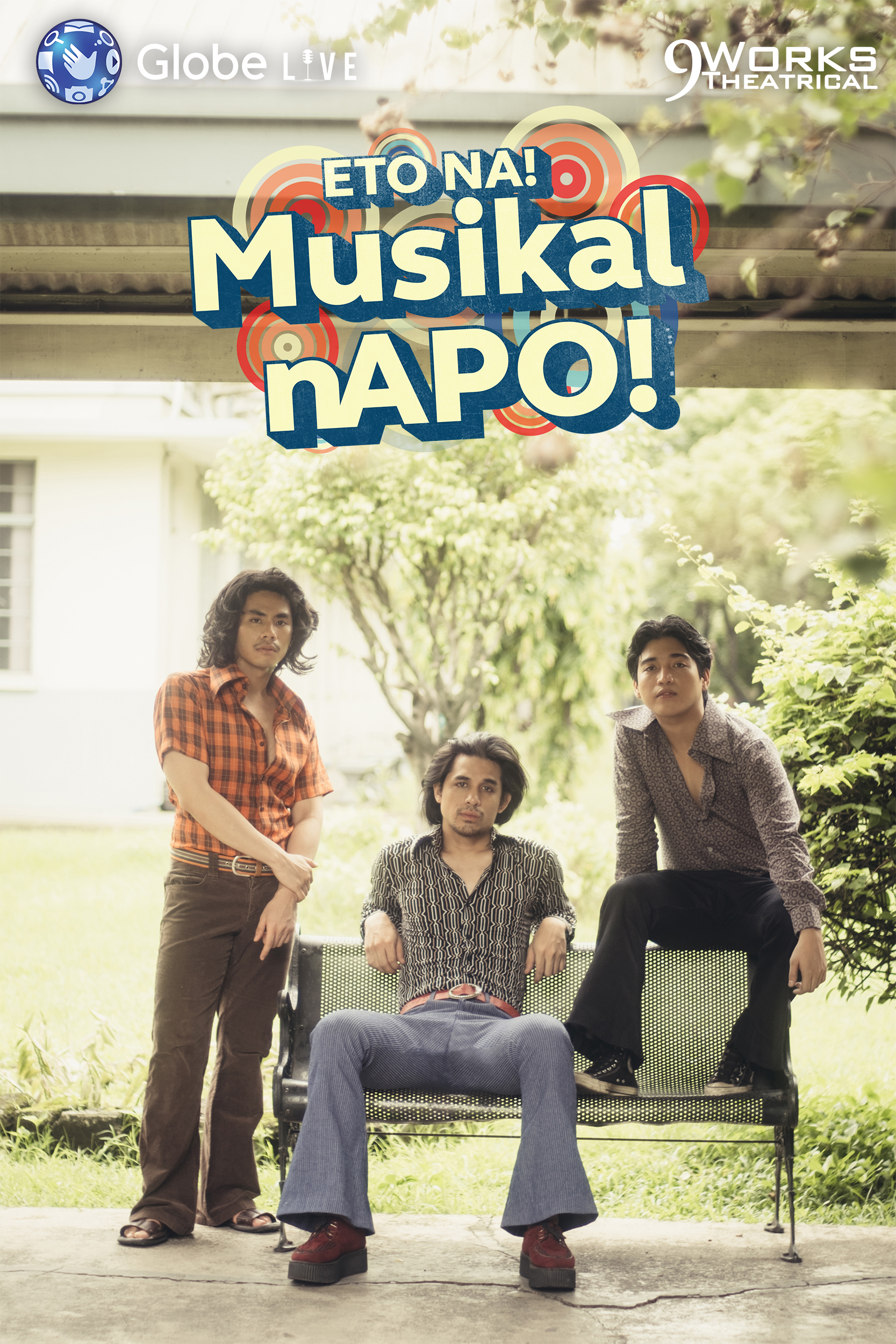
By Aubreylaine M. Salazar
There was a time when men would serenade women with When I Met You and kids would go out and play patintero with APO Hiking Society’s Blue Jeans or Salawikain playing in the background. More than 40 years later, in the age of Spotify and downloadable music, is there still room for looking back and reflecting on how people lived and loved then through APO’s music?
People behind 9 Works Theatrical, led by Santi Sta. Maria and writer-director Robbie Guevara, and Globe Live think so. In a recent media conference at the Maybank Performing Arts Theater, Guevara revealed that he had sought early on the permission of Jim Paredes, Boboy Garovillo and Danny Javier, the three musicians who make up APO Hiking Society, and since 2013 has been quietly making a musical featuring their songs.

The three, who have received their fair share of proposals and queries from others to use their music on stage, found themselves saying yes to Guevara.
The result is Eto Na! Musikal nAPO!, an original musical production written around 20 of the trio’s biggest and most memorable hits such as Pumapatak ang Ulan, Panalangin, Batang-bata ka pa and Awit ng Barkada, among others. Topbilled by Mark Bautista, Rita Daniela, Jef Flores and Jobim Javier, son of Danny Javier, the musical will run from August 3 to 26.

By coming up with all sorts of era-defining yet timeless hits—from love songs to novelty songs, and songs loaded with pointed statements (think American Junk), OPM pioneer APO Hiking Society has permanently left a mark in the lives of generations of Filipinos.
What’s more, their music continues to be played outside their time and have unintentionally created for them a legacy, which hopefully lingers up to now and resonates with today’s generation of millennials, said Paredes, who graced the event.
Guevara and his collaborators understood the impact of their music as well as the need to support Philippine theater that they decided to come up with an original production revolving around seven college students, their lives and relationships, set during the tumultuous martial law era.

Albeit not autobiographical as most would probably expect, the musical, according to Guevara, is said to reflect a lot of events in the whirlwind lives of the Ateneo-bred trio. Mirroring APO Hiking Society’s history, the seven-man barkada (the group was actually composed of 30 young men in real life) would be left with only three people, but the musical’s focus is on the four others who left the group. That’s one of the twists Guevara thought of.
As for challenges, there were plenty. One of the hardest, Guevara admitted, was choosing 20 or so APO songs to fit into a two-hour musical. If it were up to him, he would have used at least 40 songs, but fitting them all in within the allotted time would have been impossible.
He revealed that the idea of turning APO’s songs into a full-blown musical first dawned on Garrovillo in 2003. Guevara, after securing the trio’s go signal, then set to work, and to date has already made his 21st revision with the help of Jonjon Martin, the show’s dramaturg and avid APO fan. They would write the script and throw ideas together in order to find an APO song that would match a particular situation.

Before all of that, of course, they went through the process of approaching the very people who inspired the show—the APO members themselves. Apart from asking permission from Paredes and company, the team had to solicit ideas from the guys whose music they had to interpret and reinterpret. Fortunately, the veteran musicians were more than glad to provide them with inputs.
Because of his family’s bad experience during the Marcos years, the director was also originally apprehensive of tackling martial law in his production. But he eventually changed his mind after realizing that, quoting Javier, “martial law is an un-ignorable topic at the time.”
The team admitted that it was particularly hard to choose songs to showcase. And since the songs were originally sung by three men, there was also the challenge of tailoring them to fit certain female characters’ points of view. Depending on the situation, they also had to make a number of serious songs comedic, and vice versa.

But perhaps their biggest challenge was to make songs written and first sung in the ’70s and ’80s relevant to younger generations, particularly millennials. It remains to be seen on opening night if they’ve succeeded.
Despite the hurdles, the young, diverse production team remains exuberant and optimistic. What used to be a vision in Garovillo’s head is now slowly becoming a reality.
Guevara also expressed his desire, through the musicale, of bringing both the young and not-so-young together to look back at how men and women lived and behaved then.
That said, the team promises that they will not go lower when it comes to standards expected of the show. Paredes, unable to hide his excitement, said, “[It’s] a Filipino experience that took 49 years to make [and] this is a very unique proposition to those who want to watch musicals.”






